The Chromebook Pixel (2015) Review
by Brandon Chester on March 16, 2015 8:00 AM EST- Posted in
- Laptops
- Chrome OS
- Chromebook
- Chromebook Pixel
CPU Performance
Chrome OS is extremely lightweight, which makes sense for an operating system that has to run on processors that range from Intel's Core i7 at the high end, to Intel Atom and ARM processors at the low end. Most devices running Chrome OS are closer to that lower end, and that coupled with the web application nature of Chrome OS doesn't make it a large target for benchmark developers. The situation is arguably even worse than mobile benchmarking since the only benchmarks a device can be tested in are web benchmarks, but we have to work with what we have. The new Chromebook Pixel is powered by Intel's Core i5-5200U processor, which is one of Intel's new Broadwell-U parts.
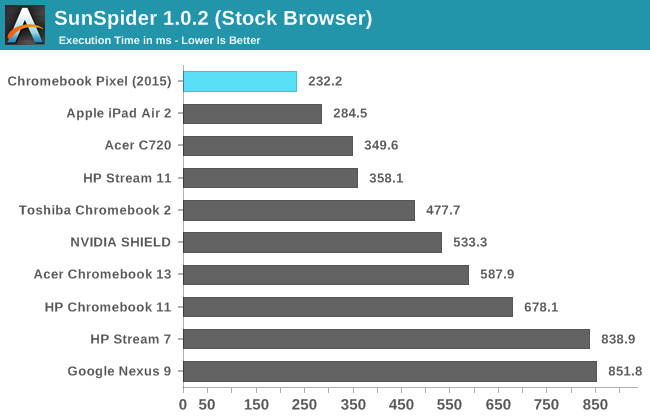
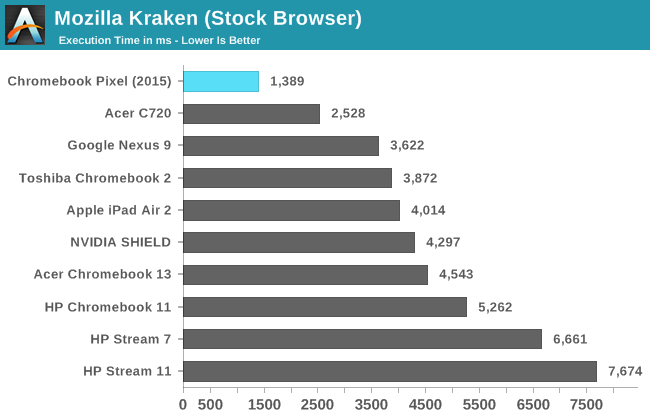
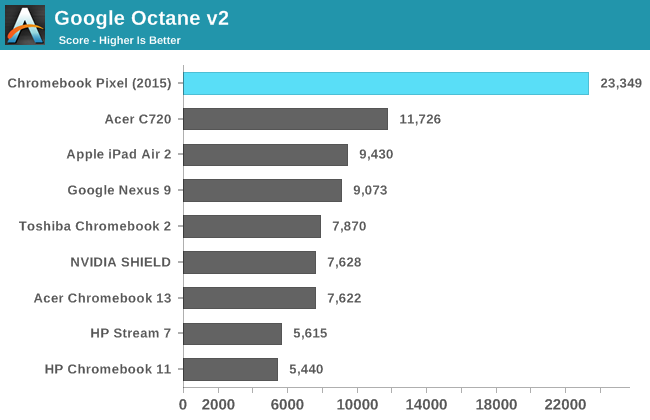
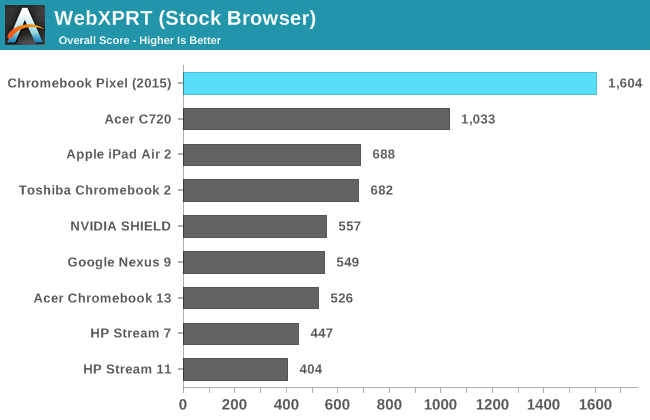
| Additional Performance Results | ||||
| Acer C720 | Acer CB13 | Toshiba Chromebook 2 | Chromebook Pixel (2015) | |
| CrXPRT | 96 | 55 | 61 | 161 |
| Spacerocks (WebGL - FPS) | 18 | 30 | 11 | 45 |
The CPU performance of the original Pixel could be described as completely overkill for running Chrome OS, and the same is true for this year's iteration. The Pixel gives you whats is undoubtedly the smoothest and fastest Google Chrome experience available. While I find the performance of an Intel i5 to be unnecessary to do something as simple as run Chrome and web apps, it definitely comes in handy if you're running some other version of Linux overtop of Chrome OS.
WiFi Performance
The 2013 Chromebook Pixel had dual spatial stream 802.11n WiFi and Bluetooth 3.0. In early 2013, this was fairly common among laptops, although 802.11ac adoption on high end laptops began not long after. The 2015 Chromebook Pixel uses Intel's Intel 7260 WiFi + BT 4.0 module, with 2x2 802.11ac support. This brings the max theoretical WiFi speed up to 866Mbps, a substantial improvement over the 300Mbps max on the 2013 model. Real world performance will almost always be lower than theoretical maximums, and to test WiFi performance I've used iPerf to get an idea of what the maximum throughput is on the Pixel.
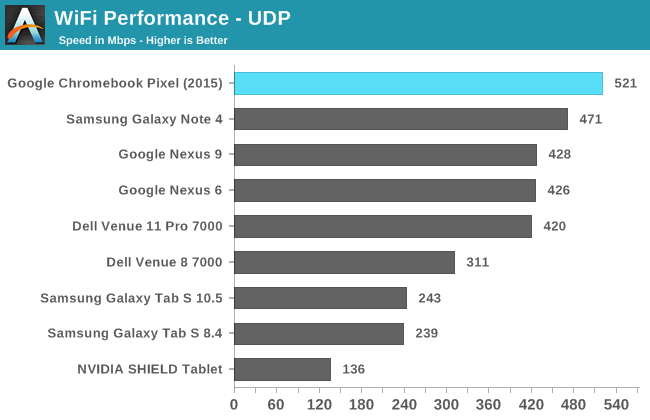
In most of our tests I've compared the Pixel to other Chromebooks, tablets, and smartphones. This is mostly due to the previously mentioned benchmarking limitations on Chrome OS. To keep consistent with this, and to avoid making unfair comparisons to laptops which aren't tested using iPerf, I've just run the Pixel through our smartphone/tablet WiFi benchmark. This still gives an idea of how fast the Pixel is, without comparing it to other laptops that were not tested in the exact same manner.










123 Comments
View All Comments
Brandon Chester - Monday, March 16, 2015 - link
The issues with benchmarking it against other laptops are explained on the CPU performance page.MantasPakenas - Monday, March 16, 2015 - link
What I meant is that I don't see how those are issues. The issue that there are very few benchmarks you can run on a Chromebook? Yeah, sure. But where is the issue of including data points you already have for other laptops for these same benchmarks? E.g. here:http://www.anandtech.com/bench/Notebook/729
You also have charging times of normal laptops, as well as browsing and video playback battery life. Why not include those? I really don't see how comparing this to an iPad makes any more sense.
JarredWalton - Monday, March 16, 2015 - link
The "Light" and "Heavy" laptop tests are completely different than what we run on Chomebooks. The Light test uses IE10/11, cycling through a set of four open tabs. We could probably do this on a Chromebook, though we would need to modify it to make it work comparably (as the Windows Light test actually runs from a batch file).The Heavy test is a different matter. We're playing a 1080p video fullscreen, surfing the web with four pages loading every ~7 seconds, and downloading over FTP at 8Mbps. Without a good FTP client, this is pretty much impossible to do on a Chromebook. Plus on every other Chromebook other than the Pixel (and maybe the Core i3 Acer models) you won't be able to do all of these tasks without the video stuttering.
Bottom line is that most Chromebooks have hardware and pricing that's similar to tablets, so we use the tablet benchmarks for comparison.
MantasPakenas - Tuesday, March 17, 2015 - link
If I understand correctly, you're saying that it would be possible to benchmark the Pixel against it's real competition, but since most of the Chromebooks are underpowered, you are putting this monster up against much weaker devices. This still doesn't make sense to me. HP Stream 11 costs, performs and competes against Chromebooks, yet you measure it mostly against high end laptops (although C720 is included in some applicable benchmarks, and even an iPad Air in charging times). I question that approach as much as this case.Just as much as it makes sense to benchmark SSDs against other SSDs, low end phones against other low end phones, high end ones against iPhone 6 and tablets, it makes sense to benchmark the Pixel against high end laptops, because it deserves that treatment. Nobody is any wiser to know it can beat all tablets and budget chromebooks.
And I bet it wouldn't stutter playing a video, downloading and surfing the web at the same time. Yet I'm doing all those things concurrently on my HP Chromebook 14, and you bet I would do it on the Pixel!
jabber - Wednesday, March 18, 2015 - link
Indeed, I've seen plenty people pay $1200+ for a Macbook/Mac just to look at Facebook/Amazon because they didn't want to deal with Windows anymore.mekpro - Monday, March 16, 2015 - link
Nice review and really fast !I wish there are more extensive tests for USB Type-C, as this is the very first laptop to ship with it. I wonder what is the maximum resolution and how many external display supported ? Is the limitation come from the USB Type-C or Broadwell or the ChromeOS itself ?
Dumbledore147 - Monday, March 16, 2015 - link
Me too. I would love to see a setup with two 4k monitors running at 60 Hz while charging the chromebook.psychobriggsy - Monday, March 16, 2015 - link
The device, like the new MacBook, supports USB 3.1 Rev 1, otherwise known as USB 3.0 (i.e., 5 Gbps) on a USB Type C port (which adds charging, displayport, USB 2.0).We'll have to wait until Broadwell supports USB 3.1 Rev 2 for 10 Gbps data transfers.
tyger11 - Monday, March 16, 2015 - link
Type-C is a connector. The underlying port itself is a standard 5gbps USB 3.0 port. It's unfortunate they didn't go with USB 3.1, but neither did the new Apple MacBook Retina (even though they're calling it 'USB 3.1 Gen 1'. Ugh.JBVertexx - Monday, March 16, 2015 - link
This is a very targeted strike directly at the MacBook pro. The current market is very small, as many have commented on. I think an equally likely user is an account executive for companies that use the Google ecosystem.My company (a pre-IPO enterprise software company) uses the entire Google ecosystem. So, when I am traveling, I use either Gmail, Google docs, or some other web-based application for nearly 100% of my use. The percentage of time that I need to actually use MS Office is getting smaller and smaller.
When you compare this against the new 13-inch MacBook pro, the specs compare very favorably. The Pixel has a stronger processor (the 13" MacBook pro only ships with an i5), but the Pixel has much less storage space, clearly catering to cloud users (100% of what I store is in the cloud).
Google may be giving these away to developers, but I don't think that is the target audience for this. There is a small sliver of working professionals who will buy this over a MacBook pro. Google is using that niche market to improve the product, improve Chrome OS, and will over the next couple years be well positioned to be a serious competitor.